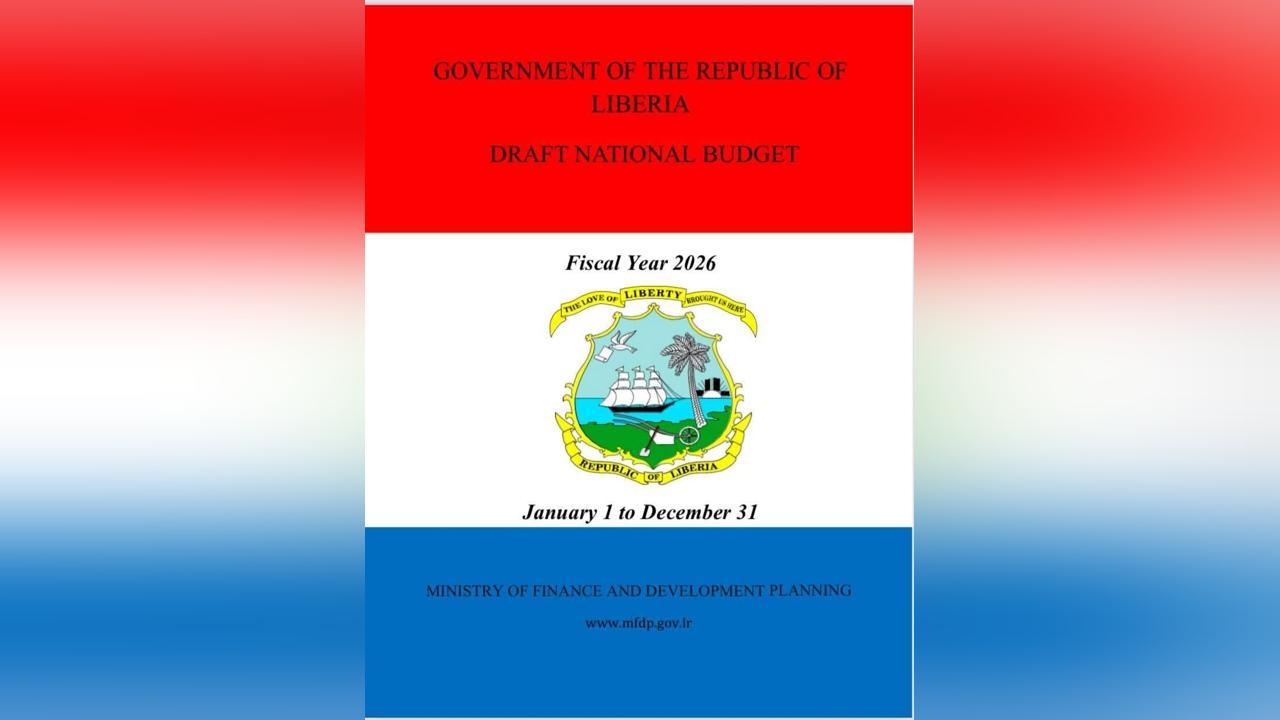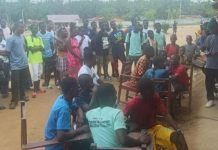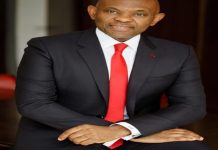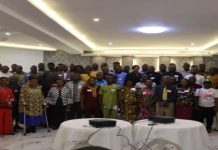Seltue Karweaye Sr.
Africa-Press – Liberia. The Liberian government has unveiled a groundbreaking national budget, marking a historic milestone with a staggering total of US$1,211,085,220 (one billion two hundred eleven million eighty-five thousand two hundred twenty United States dollars). This budget represents an impressive 37.5 percent increase from the approved fiscal year 2025 budget.
On Friday, Speaker Koon received this monumental budget for the 2026 fiscal year from the Minister of Finance and Development Planning, Mr. Augustine Kpehe Ngafuan. With this substantial funding, he expressed optimism that the revenue projections are realistic, emphasizing the need to prevent potential shortfalls.
This ambitious budget lays out a visionary plan for substantial investments in infrastructure, education, security, agriculture, and social programs. However, given Liberia’s history of revenue shortfalls and reliance on debt, it raises critical questions: Can the government realistically finance these bold initiatives? And, more significantly, will ordinary Liberians truly experience the benefits of these substantial investments?
Where is the money being allocated?
Imagine the budget as a strategic household spending plan: when a family allocates a larger portion of their income to security measures, it means they must cut back on essentials like food or rent. This year, the government is making a pivotal decision by prioritizing Security and Rule of Law, earmarking a significant US$151.83 million—an impressive increase of US$25.5 million from last year’s allocation of US$126.25 million. This investment reflects a commitment to enhancing the safety and stability of our communities.
Following closely behind, Infrastructure and Basic Services is poised to receive a robust US$133.21 million. Within this allocation, a remarkable US$114.90 million is dedicated to crucial capital investments, while US$18.32 million is reserved for recurrent expenditures. Picture this as the revitalization of a long-neglected home; if these capital projects are implemented effectively, they hold the promise of not only restoring our infrastructure but also sparking economic growth, boosting trade, and creating a wealth of job opportunities that can uplift entire communities.
In contrast, the health sector is allocated a mere US$101.71 million, which represents a scant 8.4% of the total budget. The agriculture sector, vital for our sustenance and economic well-being, has seen its funding reduced to approximately US$13.66 million—a worrying drop of US$3 million from the US$16.75 million allocated in 2025. Within this budget, US$8.90 million (65.4%) is designated for recurrent expenditures that keep operations running, while US$4.70 million (34.6%) is aimed at capital improvements. Meanwhile, the education sector receives a more favorable allocation of US$123.98 million, reflecting our commitment to nurturing the future of our children.
Yet, the critical question lingers: Will this increased funding truly translate into a better quality of life for ordinary Liberians? Experts caution that without careful planning and implementation, simply boosting budgetary allocations may fall short of delivering the real, impactful changes that citizens so desperately need. It is imperative that we harness these resources wisely, ensuring they are directed toward fostering meaningful and lasting improvements in the lives of our people.
The Overlooked Issue at Hand
Imagine a family seeking to elevate their living standards yet choosing to fund their desires through crippling loans instead of prudent saving. This mirrors Liberia’s current predicament. Despite Boakai’s assurances, fiscal discipline remains elusive, with borrowing entrenched as a central strategy in the national budget.
Consider the staggering reality: debt servicing alone is projected to consume an eye-watering US$230 million—a striking 50.3 percent increase from the estimated US$153 million in 2025. It’s akin to earning US$100,000 monthly but dedicating US$50,000 just to cover the interest on past debts. This scenario starkly illustrates Liberia’s critical dilemma—spending more on debt than on essential services like healthcare, education, agriculture, and infrastructure.
The government is hopeful that domestic revenue will soar to US$1.13 billion, representing an impressive 94% of total revenue. Meanwhile, external resources are expected to contribute a mere US$72 million, or 6%. The domestic revenue projections include Tax Revenue of US$726.97 million, Non-Tax Revenue of US$83.92 million, a significant Mittal Sign-on Bonus of US$200 million, and Contingent Revenue of US$28 million.
Considering Liberia’s troubling history of consistently missing revenue targets, current projections may be overly optimistic. Throughout the years, while Liberia’s budget has grown, the underlying revenue structure has remained perilously weak. The rollout of the 2024 budget was rife with controversy, and the early indicators for Fiscal Year 2025 are equally concerning. By the end of the first quarter, the House of Representatives’ Committee on Ways, Means, Finance, and Development Planning sounded the alarm over an alarming revenue shortfall of nearly US$18 million. This alarming situation exposes significant vulnerabilities, marked by weak compliance from state-owned enterprises (SOEs) and delays in revenue collection that jeopardize the integrity of President Joseph Boakai’s ARREST Agenda.
The Liberia Revenue Authority (LRA), tasked with the crucial responsibility of revenue mobilization, reported a distressing deficit as of May 2025. The LRA collected a mere US$336 million, falling short of the ambitious US$343 million target. This gap underscores persistent issues, particularly chronic non-compliance among SOEs and a notable lack of administrative discipline within revenue-generating agencies.
Adding to this urgent crisis, the Bureau of State Enterprises (BSE) revealed that of the 20 SOEs, only 11 submitted their quarterly reports—shockingly, just four did so punctually. While SOEs were expected to contribute US$12.37 million for the quarter, they managed to realize only US$8.49 million, resulting in a staggering deficit of nearly US$3.88 million. This ongoing trend of underperformance signals an urgent call to action. We must address these serious challenges immediately to secure fiscal stability and achieve the ambitious objectives we set for future budgets. Decisive action is not just necessary—it is imperative for ensuring a prosperous economic future for Liberia.
Several spending choices in the 2026 draft budget raise serious concerns. A glaring example is the allocation of $51.7 million to lawmakers—an increase from the previous year’s $44.3 million—allowing politicians to enrich themselves while simultaneously urging citizens to tighten their belts during challenging economic times.
Meanwhile, the Ministry of State and Presidential Affairs is set to receive $15.1 million, which encompasses travel expenses along with substantial allowances for refreshments and media engagements. In stark contrast, Social Development Services, which are vital for assisting impoverished Liberians, are granted a meager $16,124.23, up slightly from $12,485.38. Alarmingly, much of this funding will be consumed by recurrent expenses, leaving little room for meaningful support. This situation starkly resembles a corporation that decides to boost executive bonuses while offering its frontline employees a mere token raise, barely keeping pace with inflation.
The Boakai led government is placing its hopes on infrastructure development as the cornerstone of economic growth, with ambitious road projects designed to enhance connectivity and stimulate trade. However, Liberia’s historical track record is riddled with grand plans that have, more often than not, failed to deliver tangible results. A prime example is President Weah’s initiative to expand and pave the Roberts International Airport (RIA)-ELWA junction highway. Although millions of dollars have been invested, this crucial project remains incomplete, hampered by poor planning and mismanagement. Unless there is a significant overhaul in the rigor and accuracy of project feasibility studies, billions could be wasted on infrastructure that does not meet the needs of the community it’s meant to serve.
Will this time truly be different, or will these new projects devolve into yet another expensive and unfinished dream? Without stringent oversight and accountability measures, there is a real risk that these initiatives will transform into financial black holes, draining resources without yielding any of the anticipated benefits. It is imperative that the government prioritizes transparency, effective planning, and responsible management of public funds to ensure that each dollar is invested in a way that genuinely promotes the welfare of all citizens.
What does this mean for the average citizen of Liberia?
For millions of Liberians grappling with soaring food prices, escalating fuel costs, and persistently high unemployment rates, the critical question persists: Will this budget truly bring about meaningful change? Specifically, will the proposed increase in funding for the agricultural sector lead to lower food prices in local markets, making essential goods more accessible to families? Additionally, will the planned infrastructure investments, such as better roads, reliable electricity, and improved water access, generate sustainable jobs and foster economic growth, thereby enhancing the overall quality of life?
Conversely, there is a significant concern about the potential for waste and corruption to dilute these positive outcomes. Without stringent oversight and accountability measures in place, there is a risk that the benefits of the budget may never reach the intended recipients, leaving citizens frustrated and disillusioned.
Liberia’s draft budget for 2026 presents an ambitious vision for the nation’s future, yet ambition alone cannot provide sustenance or stability for its citizens. The real assessment of this budget will hinge on effective implementation, transparency in financial management, and the government’s commitment to curbing wasteful practices. Should these critical safeguards not be established, the 2026 budget runs the risk of becoming yet another precarious gamble on Liberia’s future—one that its citizens simply cannot afford to lose. I rest my pen.
Source: Liberia news The New Dawn Liberia
For More News And Analysis About Liberia Follow Africa-Press






